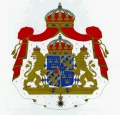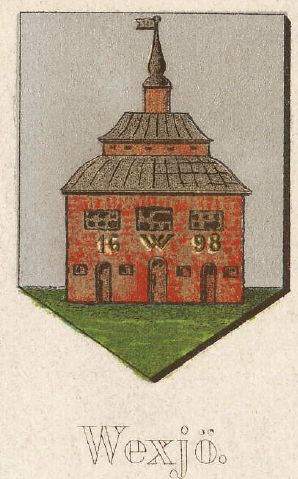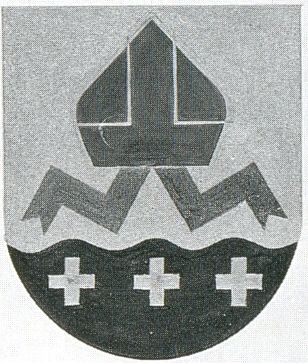Växjö
Sweden heraldry portal
This page is part of the Sweden heraldry portal |
Heraldry of the World |
|
Civic heraldry:
|
Other heraldry: |
VÄXJÖ
Province (Landskap): Småland
County (Län): Kronobergs län
Additions : 1971 Bergunda (1952 Öja, Öjaby), Braås (1952 Drev, Dädesjö, Hornaryd, Sjösås), Hovmantorp (partly), Lammhult (1952 Aneboda, Asa, Berg), Linneryd (partly), Mellersta Kinnevald (1952 Dänningelanda, Kalvsvik, Tävelsås, Vederslöv), Moheda (part;ly), Rottne (1952 Gårdsby, Söraby, Tjureda, Tolg), Östra Torsås (1952 Tegnaby (1941 Hemmesjö), Väckelsång (partly)
| Swedish |
I fält av silver en av en vågskura bildad blå stam och däröver en naturfärgad bild av S:t Sigfrid, stående, klädd i röd klädnad och med gloria av guld samt hållande i högra handen en kräkla och i den vänstra en kyrka, båda av guld. |
| English | blazon wanted |
Origin/meaning
The arms were officially granted on September 15, 1939 and confirmed in 1971.
The arms show St. Sigfrid, who supposedly founded the church in the city (city rights in 1342). His image also appeared on the old seals of the city. Until 1939 rather different arms were used by the city, see images below.
| The arms as shown by Liljeblad, 1878 |
The arms in the Kaffe Hag album +/- 1935 |
| The arms on a local coin (image from Facebook) |
In 1973, after the merger with the surrounding municipalities, the proposal below was made by Lennart Rohde but not adopted.
| The proposal from 1973 |
Contact and Support
Partners:
Your logo here ?
Contact us
© since 1995, Heraldry of the World, Ralf Hartemink 
Index of the site
Literature: Nevéus and de Waern, 1992; Image from the Riksarkivet Sverige; information by Marcus Karlsson
















